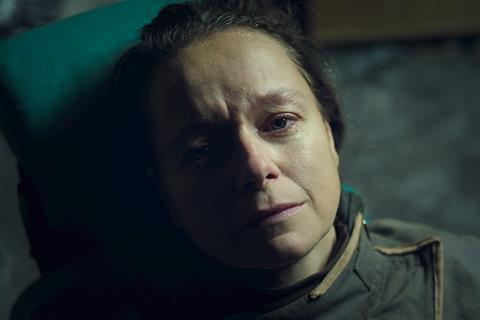Asif Kapadia blends documentary and fiction to present a damning hypothesis of Earth’s dystopian future

Dir: Asif Kapadia. UK. 2024. 82mins
A curious mash-up of dystopian sci-fi and state-of-the-world documentary
Having cornered the market in documentaries that probe the seeds of doom germinating in the lives of gifted celebrities who died too young – Ayrton Senna, Amy Winehouse, Maradona – Kapadia makes an audacious attempt to do the same here for our fragile, ravaged planet. Eschewing subtlety, he presents, in the film’s documentary segments, a roll-call of heroes and villains. The latter stretch from Donald Trump, Narendra Modi and the entire Chinese state apparatus through to Cambridge Analytica, Elon Musk and Jeff Bezos.
2073 premieres out of competition in Venice. Just don’t expect it to be picked up by Amazon Studios anytime soon – and the film will need to get itself seen in some form, theatrical or otherwise, before too long, given the limited shelf life of any film that rests its case on many of today’s political leaders. Unless of course he’s right, and they all turn into long-stay dictators – at which point there may be other distribution issues.
The film is constructed as a future house full of windows. This house, on-screen titles inform us, is the city of New San Francisco. Shot almost entirely on a LED wall, the exteriors of this toxic metropolis show a nature-free place under military control cloaked in red smog, its airspace swarming with surveillance drones, where the elite live at the top of tall towers stuffed with prestige art that rise above the pollution layer.
A news report glimpsed on a huge street-mounted video screen marks this as the 30th year in the rule of ‘Chairwoman Trump’ (presumably a nonagenarian Ivanka?), but this visual one-liner is never developed. After that flashy intro, 2073 ends up spending most of its future time in a former Bloomingdale’s department store that has since become a dank and crumbling hideout for those – like Samantha Morton’s mute Ghost – who have dropped or opted out of the repressive system above and emerge at night to ‘glean’ for food and cast-offs.
So far, so Escape From New York. Having chosen silence after her beloved grandmother was apprehended years before, Morton’s wary, weary survivor shares her thoughts with us in melancholic chunks of voice-over. We never find out much about ‘The Event’ – a global apocalypse which took place in 2034. But Ghost is determined to hold on to collective memory – a value that has been all but erased in this Orwellian dystopia. It’s explored through the photographs, books and other analogue detritus she has collected in her den in what was once the store’s shoe department, as well as in one of the few brief future scenes in which another character actually speaks (a history professor played by Naomi Ackie).
Kapadia uses Ghost to take us back to some of the disaster’s root causes in our own time. A digital on-screen year-clock ticks back – and we’re in 1997, when unrest in Xinjiang province first led the Chinese regime to begin to plan the large-scale incarceration, re-education and digital or medical mapping of its Uyghur population. Or we’re in 2017, when it was already becoming clear that data harvesting was allowing tech companies to act as “behaviour modification platforms”, influencing everything from buying choices to elections.
Consisting of a rapid-fire montage of TV news reports, social media content, CCTV and spy camera footage and infographics, these inserts are narrated not by Ghost but by a series of individuals listed in the end credits as ‘collaborators’. These include British environmental and political journalist George Monbiot, and Nobel-prizewinning Filipino and US journalist Maria Dessa – a repeat narrator who emerges as one of the film’s most articulate and courageous voices.
Does the alternation between documentary inserts and sci-fi superstructure work? Not always – more than once it’s a wrench to be dragged back to Ghost’s basement. But Kapadia and his co-scribe Tony Grisoni seem to understand that the pummelled audience can take only so much cinematic doomscrolling, so many cars emerging from road tunnels into raging forest fires.
Mostly, it avoids stridency, though one wishes Kapadia hadn’t used journalist Nilufer Demir’s famous viral photograph of a dead Syrian-Kurdish toddler on a Greek beach. Data harvesting is not the only charge to be laid against Big Tech and our casual consent to its tactics. Another is the decontextualization of human tragedies.
Production companies: Lafcadia Productions
International sales: Neon Rated, Dan@neonrated.com
Producers: Asif Kapadia, George Chignell
Screenplay: Asif Kapadia, Tony Grisoni
Cinematography: Bradford Young
Production design: Robin Brown
Editing: Chris King, Sylvie Landra
Music: Antonio Pinto
Main cast: Samantha Morton, Naomi Ackie, Hector Hewer















![[L-R]: Amanda Villavieja, Laia Casanovas, Yasmina Praderas](https://d1nslcd7m2225b.cloudfront.net/Pictures/274x183/6/4/1/1471641_pxl_20251224_103354743_618426_crop.jpg)








